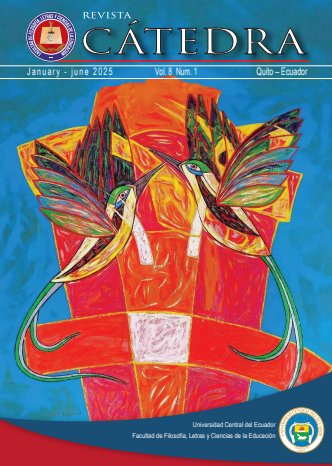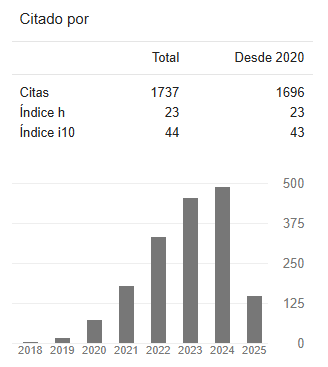El concepto de la persona en la cultura Bantú-Fang
DOI:
https://doi.org/10.29166/catedra.v8i1.6281Palabras clave:
Bantú-fang, Comunidades africanas, Cultura, Dignidad, PersonaResumen
Entrar en la globalización sin identidad, o dejando de lado la propia, está pasando factura a Guinea Ecuatorial. La mayoría de sus jóvenes desconocen su identidad cultural. Por ello, reflexionar sobre el concepto de persona resulta crucial para ayudarles a redescubrir su identidad. Este trabajo tiene como objetivo definir el concepto de persona en la cultura bantú-fang y analizar la influencia que este concepto pudo haber sufrido durante la colonización. El método empleado en esta investigación ha sido analítico-descriptivo. A través de un análisis de la lengua fang, se exploró el concepto de persona. Los resultados indican que el concepto de persona fang no ha sufrido aculturación. Esto se debe a que la acción colonizadora se focalizó en la destrucción del patrimonio cultural tangible, dejando relativamente intactos los aspectos intelectuales y conceptuales. Además, el análisis del término mot (hombre) reveló una doble acepción: ontológica y moral. En el aspecto ontológico, la persona se denomina muan mot (aquel que pertenece a la raza humana). En la dimensión moral, el término mot refleja la aceptación sociocultural de la persona dentro de la comunidad. En conclusión, ser persona, según la perspectiva fang, implica tanto pertenecer a la raza humana como actuar conforme a los valores y normas que se esperan del ser humano. Esta visión integral resalta la importancia de mantener viva la identidad cultural en un mundo globalizado.
Descargas
Citas
Aixelà, Y., Maillart, L., & Martí, J. (2009). Introducción a los estudios africanos. Barcelona: Egipcíaques.
Alvarez Munárriz, L., & Guerrero, J. (1999). Biotecnología y familia. Factores socioculturales y éticos. Murcia: Diego Marín.
Armenta López, E., & Gamboa, S. (2017). Hombre, sociedad y cultura. Ciudad de México: UAS/DGEP
Biyogue, B. A. (29 de marzo de 2018). Conceptions et comportements des fang face aux questions de fécondité et de stérilité : regard anthropologique sur une société patrininéaire du Gabon. Anthropologie sociale et ethnologie. Recuperado el 2023 de Noviembre de 27, de https://hal.univ-lorraine.fr/tel-()01749201.
Comisión Española de Ayuda al Refugiado. (2018). África en el olvido. Estudios de caso. Madrid: Universidad Autónoma de Madrid.
Dominguez Guillén, M. (2019). La dignidad: principio y soporte de la persona humana. Revista Tachirense de Derecho, 5, 77-104.
Ferrer, U. (2000). ¿Qué ser persona? Madrid
Galán Moreno, N. (2015). Fundamentos de la cultura fang. Su tradición y estética. Valencia: Universitat Politécnica de Valencia
García-López, J. (1976). La persona humana. Navarra: Universidad de Navarra.
Geertz , C. (1973). La interpretación de las culturas. Nueva York: Editorial Gedisa.
Krotz, E. (2004). Cinco ideas falsas sobre la cultura, en Antropología sobre cultura popular e indígena. Consejo Nacional para la Cultura y las Artes, 13-19.
Descargas
Publicado
Versiones
- 2025-07-02 (4)
- 2025-07-02 (3)
- 2025-02-21 (2)
- 2025-01-30 (1)









